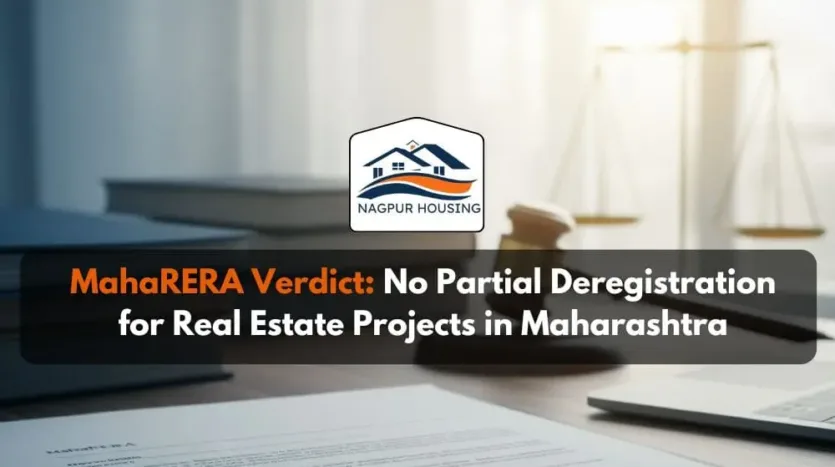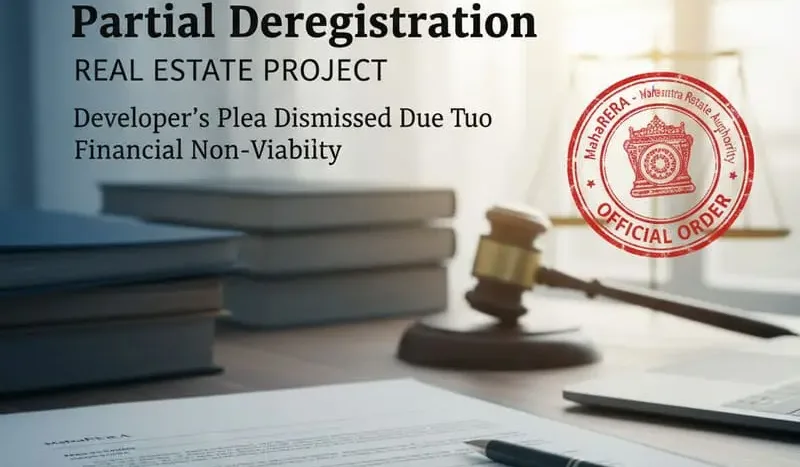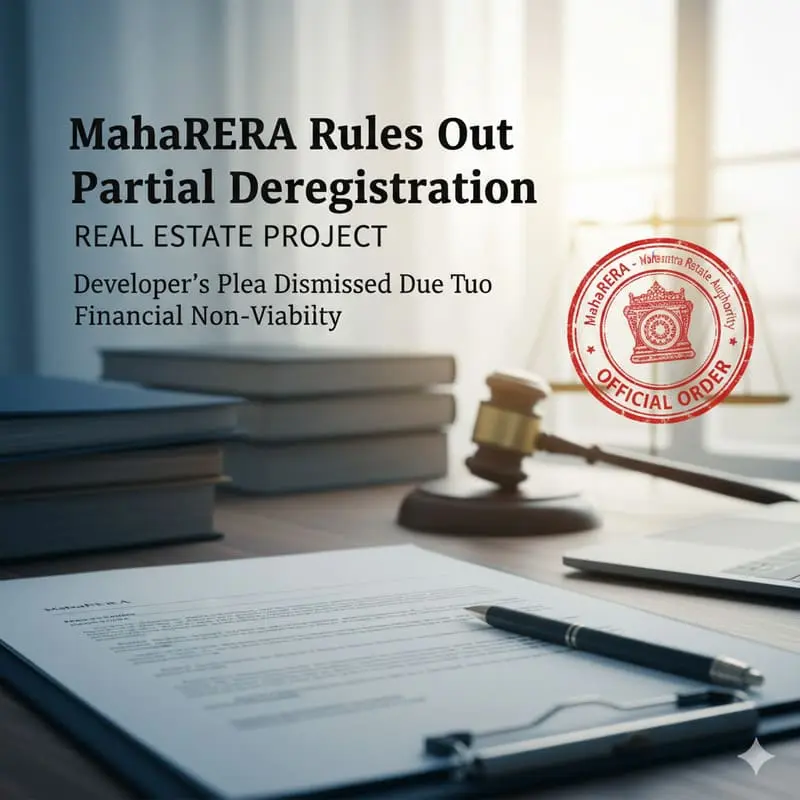MahaRERA Rejects Partial Deregistration of Nagpur Real Estate Project
In India’s fast-growing real estate sector, the rules of transparency and accountability are slowly but surely reshaping the way developers and homebuyers interact. At the heart of this change lies the Real Estate (Regulation and Development) Act, 2016 (RERA), a legislation that promised to bring order to a sector often criticized for its opacity and delays.
A recent decision by the Maharashtra Real Estate Regulatory Authority (MahaRERA) highlights just how firmly the regulator intends to uphold the sanctity of its provisions. The case involved a prominent Nagpur-based developer who sought to partially deregister a mixed-use project in the MIHAN-SEZ area. The reason? Financial non-viability and zero bookings in the residential wing.
But MahaRERA had a clear message: once registered, a project cannot be partially deregistered. Let’s dive into the details, the background of the case, and what this means for developers and homebuyers in Maharashtra.
You might like: How Metro, MIHAN, and Infrastructure Are Reshaping Nagpur’s Housing Market
Setting the Stage: RERA and Its Purpose
Before looking at the case itself, it’s important to revisit why RERA exists. Passed in 2016, the Real Estate Regulation and Development Act aimed to:
- Protect the interests of homebuyers.
- Increase transparency in the sector.
- Ensure timely delivery of projects.
- Prevent misuse of funds by developers.
Under RERA, every real estate project above a certain size must be registered with the respective state regulatory authority. Once registered, the developer is bound by strict disclosure norms, timelines, and promises made to buyers.
This registration is not just paperwork. It is a legal commitment that the project, whether residential, commercial, or mixed-use, will be completed and delivered as approved.
The Case: Moraj Infratech’s Dilemma in Nagpur
The story begins with Moraj Infratech Private Limited, a well-known developer in Nagpur. The company was executing a mixed-use project inside the prestigious MIHAN-SEZ (Multi-modal International Cargo Hub and Airport at Nagpur-Special Economic Zone).
The project had two distinct parts:
- A commercial section with 37 units.
- A residential wing, comprising the building named Ganga.
Progress on the Commercial Wing
The commercial part of the project was already moving smoothly. According to the submissions made to MahaRERA:
- 37 commercial units were planned.
- Substantial work was completed.
- A part Occupancy Certificate (OC) was granted on December 29, 2023.
- Out of 37, 35 units were sold.
- 32 sale agreements were executed.
- Possession had been handed over to buyers.
This showed strong demand and successful execution in the commercial side of the project.
Trouble with the Residential Wing
The residential portion, however, told a completely different story:
- Zero bookings had been made.
- No units were offered for sale.
- Only 35% of construction work had been completed.
Faced with low demand and rising costs, the developer felt that continuing the residential building was financially non-viable. In a bid to cut losses, Moraj Infratech applied to MahaRERA to deregister the residential wing, while keeping the commercial section valid.
MahaRERA’s Decision: No to Partial Deregistration
On September 19, 2025, MahaRERA passed a detailed order rejecting the plea. The regulator’s reasoning was grounded in the principles of RERA and the broader goal of ensuring accountability.
Key Points from the Order
- Registration is a holistic commitment
Once a project is registered under Section 5 of RERA, it represents the developer’s intent to complete and deliver the entire project. Registration is not symbolic or optional. - Partial deregistration is not permitted
MahaRERA clarified that the law does not allow for “partial deregistration.” Either a project remains registered in full, or, in very specific circumstances, it may be deregistered in its entirety. The order explicitly said: “Deregistration of part of a project registration cannot be made possible as there is no such thing as partially deregistering a part and keeping the remaining part valid and subsisting.” - Buyers’ interests must be safeguarded
Although no units were sold in the residential wing, the regulator emphasized that the integrity of the project registration system cannot be compromised. Granting partial deregistration could set a precedent that weakens the spirit of RERA.
A Ray of Relief: Correction Allowed
While MahaRERA denied the plea for partial deregistration, it did offer the developer a practical solution. The authority permitted corrections in the project details, specifically the deletion of the residential building, but only through a formal correction process.
The order stated:
- The developer may apply for correction to delete the residential wing.
- MahaRERA’s Director of Registration would facilitate this process.
- The correction must be carried out within 60 days of filing the application.
Importantly, MahaRERA refrained from imposing blanket penalties or taking drastic action, recognizing that no allottees were impacted in the residential portion. This balance shows the regulator’s willingness to be flexible while still upholding the law.
Why This Case Matters
The decision is not just about one project in Nagpur. It highlights deeper issues in real estate regulation and offers lessons for developers, buyers, and policymakers.
1. For Developers
- Due diligence is crucial: Developers must carefully assess the financial and market viability of every project component before seeking registration.
- Commitment matters: Once registered, backing out midway, whether due to market shifts or financial stress, is not an option under RERA.
- Flexibility exists, but within limits: Corrections are possible, but only if they don’t hurt buyer interests.
2. For Homebuyers
- Stronger protection: Buyers can feel reassured that RERA does not allow developers to abandon parts of projects at will.
- Transparency in corrections: Even changes like deleting a building must follow due process, ensuring accountability.
3. For the Real Estate Sector
- Precedent-setting: This ruling sets a clear precedent against partial deregistration, guiding future disputes.
- Reinforcing RERA’s intent: It strengthens the idea that RERA is not just a registration system but a commitment to delivery.
The Larger Picture: Real Estate in Nagpur’s MIHAN-SEZ
To understand the backdrop, it’s worth looking at Nagpur’s MIHAN-SEZ. As one of the largest SEZ projects in India, MIHAN is designed to boost Nagpur’s role as a logistics and aviation hub.
Developers see MIHAN as a golden opportunity, but it also comes with challenges:
- Market absorption: While commercial spaces often find buyers quickly, residential demand can lag.
- Financial pressure: High land costs and infrastructure expenses make developers cautious.
- Regulatory discipline: With MahaRERA closely monitoring projects, compliance has become non-negotiable.
The Moraj Infratech case, therefore, is also a reflection of the real demand dynamics in MIHAN, strong for commercial units but still developing for residential.
Storytelling Angle: A Tale of Two Wings
Think of this project as a bird with two wings: one commercial, one residential. The commercial wing was healthy, strong, and already flying high, with units sold and buyers settled in.
The residential wing, however, struggled to take flight. No buyers, incomplete construction, and financial turbulence weighed it down. The developer, facing the burden, thought of clipping this wing altogether.
But MahaRERA stepped in, reminding everyone that a bird cannot fly with one wing cut off, it must maintain balance. Instead of allowing the wing to be chopped off midway, the regulator suggested a surgical correction, one that respects both the bird’s structure and the sky it flies in.
What Lies Ahead for Developers
The verdict is a reminder for developers across Maharashtra:
- Plan projects holistically: Don’t register unless there is a realistic path to completion.
- Understand demand cycles: Commercial and residential demands may vary, plan accordingly.
- Use correction processes wisely: Instead of rushing to deregister, explore permissible corrections.
It also highlights the need for developers to rethink strategies in emerging markets like Nagpur, where commercial hubs may outpace residential settlements in the short term.
Conclusion: A Firm Yet Balanced Stand
MahaRERA’s decision in this case underscores the seriousness of project registration under RERA. By rejecting partial deregistration, the authority reinforced the principle that once a commitment is made, it must be honored in spirit and letter.
At the same time, by allowing correction, it showed flexibility and a practical approach toward developers struggling with market realities.
For buyers, this decision strengthens trust in the system. For developers, it is a wake-up call to be more cautious and strategic. And for Nagpur’s real estate ecosystem, it is another step in the journey toward transparency, accountability, and sustainable growth.
As the sector evolves, one thing is clear: RERA is not just a law, it is a promise. A promise that projects once started will be carried through, not abandoned halfway.












